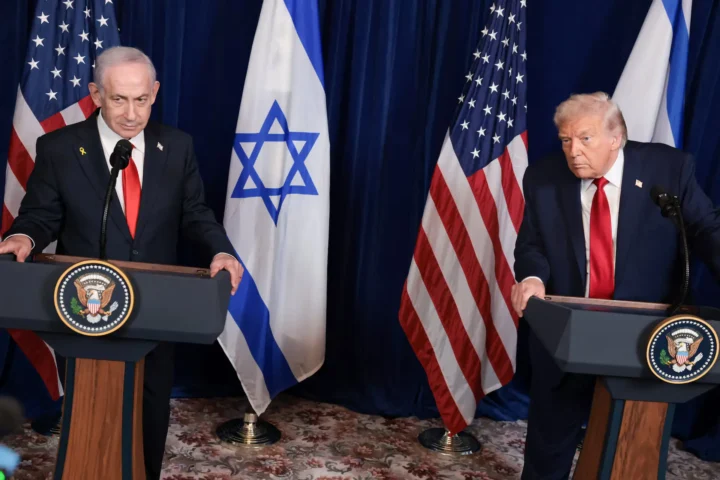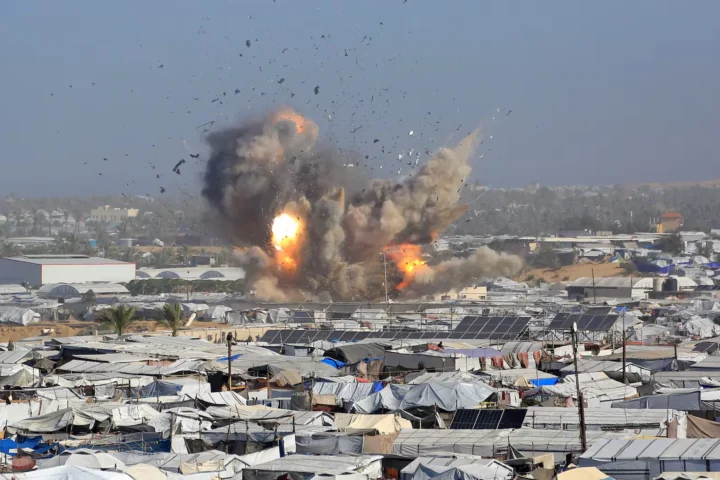For decades, U.S. foreign policy has oscillated between the lofty rhetoric of peace and the harsh reality of imperial interests. Yet, when it comes to Palestine and the Middle East, the chasm between words and deeds has never been starker. While Donald Trump’s bombastic presidency made no effort to mask its disdain for Palestinian sovereignty, Joe Biden’s administration—despite its softer tone—merely carried forward Trump’s blueprint. As the world braces for a potential second Trump term, it’s time to confront an uncomfortable truth: U.S. policy in the region is not the whim of a single leader but a bipartisan project to dismantle Palestinian aspirations and fortify U.S. hegemony.
The façade of the “two-state solution” was among the first casualties of this policy. Trump shattered any illusions by relocating the U.S. embassy to Jerusalem, greenlighting Israeli annexation efforts, and promoting illegal settlements. He reduced Palestinian statehood to an economic barter: dollars in exchange for dignity. Yet Biden, who promised to “restore America’s moral leadership,” did nothing to reverse these moves. The embassy in Jerusalem remains open, settlements continue to metastasize, and U.S. diplomacy clings to a farcical notion that Israel and Palestine can negotiate a peace that one side categorically rejects.
The so-called Abraham Accords represent another cornerstone of this bipartisan agenda. Sold as a harbinger of peace, these agreements are, in reality, a death knell for Palestinian self-determination. By normalizing relations between Israel and Arab states like the UAE, Bahrain, and potentially Saudi Arabia, the accords legitimize Israel’s occupation and codify its dominance over historic Palestine. They erase the Palestinian right of return and transform refugees into forgotten relics of a forsaken cause. Worse still, they position Israel as a regional enforcer of U.S. interests, deepening the divide between Arab nations and the Palestinian people they once claimed to champion.
But perhaps the most explosive element of this policy is the containment of Iran. Trump’s withdrawal from the Joint Comprehensive Plan of Action (JCPOA) and imposition of crippling sanctions marked a sharp escalation in U.S.-Iran tensions. Biden, despite campaign promises to revive the nuclear deal, has perpetuated this maximum pressure campaign. Beyond Iran’s borders, Washington’s fixation on isolating Tehran fuels a dangerous arms race and solidifies alliances designed to encircle not just Iran but also other emerging powers like China. In this grand chessboard, the Palestinian cause is reduced to a pawn sacrificed for broader imperial ambitions.
What’s most chilling, however, is how this bipartisan strategy emboldens Israel’s most extreme ambitions. Under Biden’s watch, Israel has accelerated its campaign of dispossession in the West Bank and Gaza. Entire neighborhoods are razed; families are torn from their homes; and Gaza, already besieged, teeters on the brink of total collapse. The slow genocide that has defined Israeli policy for decades has morphed into an unrelenting blitz, with U.S. complicity veiled in the language of “self-defense” and “security.”
The stakes could not be higher. A second Trump term would likely see even more brazen support for Israel’s annexation of the West Bank, the permanent fragmentation of Gaza, and the forced displacement of Palestinians under the guise of “peace plans.” This trajectory risks not only extinguishing the Palestinian dream of sovereignty but also igniting wider regional conflagrations. Ordinary Americans, who often bear the brunt of endless wars through economic and human costs, will find themselves entangled in yet another cycle of violence fueled by imperial overreach.
Yet, despite the formidable machinery of empire, resistance persists. Palestinians, steadfast in their struggle for justice, refuse to be erased. Their fight is mirrored in the broader Arab world, where populations are weary of autocratic rulers who sell their sovereignty for American weapons and diplomatic cover. These communities understand that justice is not a negotiable commodity, and that true peace can only emerge when the rights and dignity of all people are recognized.
The road ahead is perilous, but history has shown that empires crumble when their foundations are built on injustice. The question now is whether the U.S. will continue down this destructive path or whether a new generation of leaders and citizens will rise to demand a foreign policy rooted in human rights, not hegemony. One thing is clear: the Palestinian fight for freedom is far from over, and its outcome will shape the future not only of the Middle East but of the world.











